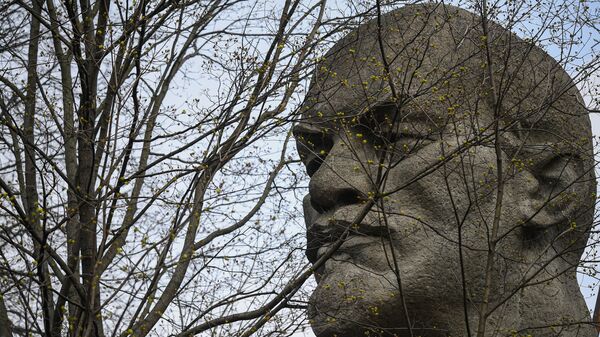Vladimir Lenin is termed controversial for his ideas and philosophy by historians, but India has a connection with the Russian revolutionary leader which dates back to the country's struggle for freedom.
On his 150th birth anniversary, Twitter has been flooded with tributes to the leader, whose ideas have influenced Indian politics.
Global Capitalism & Capitalist Health Policy Has left Millions out of the health system be It US, Europe or India.
— Priyank Mani (@m_d_pm) April 22, 2020
On the 150th Birth Anniversary of Comrade #Lenin, we rededicate ourselves to the task of building a just & equal Socialist World!
Red Salute Comrade Lenin! pic.twitter.com/a6ZPNFKx1Y
Following the Russian revol led by Lenin in 1917, several workers uprising took place in India as well in 1918 and 1919, especially in textile mills in Bombay. Also, On October 20, 1920, three years after the Russian Revolution, the All-India Trade Union Congress was born.
— Korah Abraham (@thekorahabraham) April 22, 2020
To date, left-wing student organisations in India advocate the ideas of the founder of the Soviet Union. There have been many Indian artists who have remained admirers of Lenin and have penned poems about him.
Revolutionary Greetings on the 150th Birthday of VI Lenin, the leader of Russian Revolution and our living Guide to Action..
— AISF (@AISFofficial) April 22, 2020
Comrade @VickyMahesari
General Secretary, All India Students' Federation (AISF)#Lenin150 #LeninAt150 #LeninLives pic.twitter.com/o16zooIhGH
Poet and lyricist Sahir Ludhianvi was also a part of the PWA; he wrote two poems about Lenin, one in 1917 and another in 1970.#LeninAt150 #Lenin150
— A (@begumdukhtar) April 22, 2020
(Source: Jaag Uthe Khwaab Kayeen: Sahir Ki Mukammal Shayari, Penguin Books India, 2010) https://t.co/KakMvCLjth pic.twitter.com/qA2ZcjiPvh
Known as the leader of the working masses, Lenin led India's leaders at the time of the freedom struggle, such as Jawaharlal Nehru, Mahatma Gandhi, B.R. Ambedkar, and Savarkar, to agree upon one thing and that was his ideas.
Lenin was also ahead in appreciating India’s mass movements for freedom: in the 1900s, freedom fighter Bal Gangadhar Tilak developed one of the first mass movements, Swadeshi, where the working class participated enthusiastically. In 1909, Tilak was slapped with sedition charges by the British authorities, invoking mass protests.
Lenin slammed the British, saying that with the “infamous sentence pronounced by the British jackals on the Indian democrat Tilak”, the “British regime in India is doomed”.
Soon after the 1917 Bolshevik Revolution, India witnessed the Ghadar movement, the Khilafat impulse, and the Reshmi Roomal Tehrik — all mass movements against the British colonial rule.
India’s first Prime Minister Jawaharlal Nehru even wrote "almost at the same time as the October Revolution led by the great Lenin, we in India began a new phase in our struggle for freedom. Our people for many years were engaged in this struggle with courage and patience. And although under the leadership of Gandhi we followed another path, we were influenced by the example of Lenin”.
Gandhi and Lenin’s ideas were two ends of the spectrum, but the two agreed on the definition of socialism, which termed it as more than just a transformation in economic relations, but a transformation in human psychology as well.
At present, the Hindutva right has reviled the revolutionary leader — considering the recent incident of removing his statue in the north-eastern state of Tripura— but their ideologue Veer Savarkar was influenced by Lenin’s thoughts as well. Indian Prime Minister Narenda Modi — who later condemned the incident of razing Lenin’s statue by his party workers — is also influenced by socialism and has been called a torchbearer of Lenin’s economic ideology by several experts.


